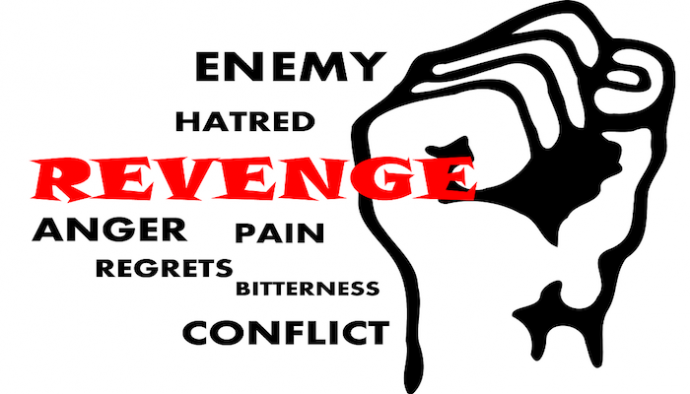“Culture” is the environment in which you live. It’s around us, within us, and formed by us. It is the unspoken rules of behavior that guide the processes of the world at large. Your home has a culture. Your workplace has a culture. And society at large has a culture.
In terms of that society at large, then, if you had to sum up that culture in which we are living in one word, what one word would you choose?
You could make a case for “consumerism.” We are certainly a people who want everything our way, right away, and those who cry foul when it doesn’t happen. You could also choose the word “sex” because sex sells. And apparently it sells everything everywhere. Or maybe you would choose “distracted.” I get that one, too, because there seems to be a lesser and lesser amount of focus happening in our lives, families, and even work as time goes on.
But here’s another option to describe our societal culture in one word: “Revenge.”
You see it everywhere. You see political groups taking aim at one another in retribution for this thing or that. You see people taking their revenge on social media through their reviews and critiques. You see grudges being held from top to bottom, and then all of us looking for ways to give someone else what we perceive is coming to them. We are, I think, people of vengeance.
But Christians? Christians are meant to live above the culture. This is part of what it means to be salt and light – that we are those who, though we live in the midst of a culture, influence that culture rather than being influenced by it. To add another analogy, we are the M&M’s in the trail mix. We live inside the mix of everything else, but everything else starts to have a hint of chocolate.
This is particularly true when it comes to a revenge driven culture. For because Christians are meant to live above the culture in general, we must also be committed to rise above the level of vengeance.
“Sure thing,” you might say. “I’ve got no problems with that. I’m not plotting in my evil lair to wreak havoc on anyone’s life.” Well I’m not either, and yet the spirit of vengeance still lurks within my heart. I know it’s there when I read tweets and Facebook updates from people and pick them apart knowing their lives can’t be as good as they purport them to be. I know it’s there because I take the smallest level of delight in seeing something unfortunate happen to someone else. I know it’s there when I don’t receive the service I think I deserve and look for a way to lash out. I know it’s there when I do something kind or generous for another and then hold a subtle and internal sense of superiority over them expecting them to pay me back in some way.
All of these things show me the vengeance in myself. Maybe you resonate with that as well.
This is different than a sense of justice, for justice is focused on what is good and true and right. Vengeance is about me. What I deserved and didn’t get. And then making someone feel a similar amount of pain that I myself have felt.
So how does the Christian live above a culture of vengeance?
It begins with recognizing that I, myself, am not able to dispense true justice and therefore any attempt at revenge is always flawed. I don’t know who really deserves what because I don’t know the depths of my own heart and sin much less anyone else’s. So I live above vengeance first of all by recognizing my own inability to discern and execute true justice. But then I must also recognize that God alone is the One who can actually execute justice. This is why Paul would tell us so clearly:
“Friends, do not avenge yourselves; instead, leave room for God’s wrath, because it is written, Vengeance belongs to me; I will repay, says the Lord” (Romans 12:19).
Do not take matters into your own hands. It’s not that there’s not justice to be served; there very well might be. But it’s not for you or I to administer it because we aren’t capable of doing so in a true and good and noble way. This belongs to the Lord.
For us? Well, our job is to recognize first and foremost that we, too, ought to have justice dispensed against us. And when we grasp the immensity of how grievous our own offenses are perhaps it takes some of the fire out of our own desire for revenge.
It is by faith, then, that we live above a culture of revenge. For by faith we believe that the Lord will do His job, and we don’t have to do it for Him.
Subscribe to MichaelKelley.co
Never miss a new post. Subscribe to receive these posts in your inbox and to receive information about new discipleship resources.




